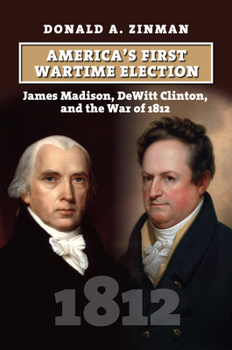America's First Wartime Election: James Madison, DeWitt Clinton, and the War of 1812
(Part of the American Presidential Elections Series)
Select Format
Select Condition 
Book Overview
As the heir apparent to the presidency in 1808, James Madison had a substantial reputation and an impressive list of credentials, including having cofounded the Democratic-Republican party with Thomas Jefferson and serving as Jefferson's secretary of state. Despite this, Madison's presidential victory in 1808 was hardly uncontested as he faced internal opposition from supporters of James Monroe and Vice President George Clinton. In 1812, then, it was by no means a sure thing that Madison would secure a second term, and that uncertainty grew substantially after Madison essentially asked Congress for a declaration of war on June 1, 1812, mere months before the election.
America's First Wartime Election focuses on an overlooked moment in political history. The War of 1812 has generated a significant amount of attention, overshadowing the election that took place in the early stages of the conflict. As the United States and Great Britain clashed on the battlefield, President James Madison was challenged by DeWitt Clinton, the nephew of George Clinton, who was the simultaneous mayor of New York City and the lieutenant governor of his state. Clinton held a base of Democratic-Republican support in New York where many in his party opposed the war. Many New Yorkers also resented Virginia's domination of the presidency going back to George Washington's tenure. Other Democratic-Republicans supported the war but faulted Madison for his poor preparations and early battlefield setbacks. United in their opposition to the war, Federalists joined forces with Clinton, but the alliance was tardy, disorganized, and awkward.
The story of this election is also a tale of weak political parties. The Federalist party had steadily lost strength since the election of Jefferson in 1800, and the Democratic-Republican party was still a young, disjointed, and fractious coalition. In order to sustain the party that he had helped to start, Madison was under pressure not only to secure his reelection but also to successfully conduct the war. While Madison had vulnerabilities, given America's poor preparation for the war, the fusionist ticket supporting Clinton was poorly positioned to challenge the incumbent president. Political parties in general were still in their infancy, thus complicating efforts to build a coherent alternative to Madison. For a fusion ticket to succeed in elections, strong political parties are necessary, which was not the case in 1812. Red-hot passions over the divisive War of 1812 overlapped with a presidential election that became a referendum on the conflict itself. Momentum is important in politics--a principle that was just as important over 200 years ago as it is today.
Written for scholars, students, and the public alike, Donald A. Zinman's accessible study of this important but often ignored election is another illuminating entry in the University Press of Kansas's longstanding American Presidential Elections series.





